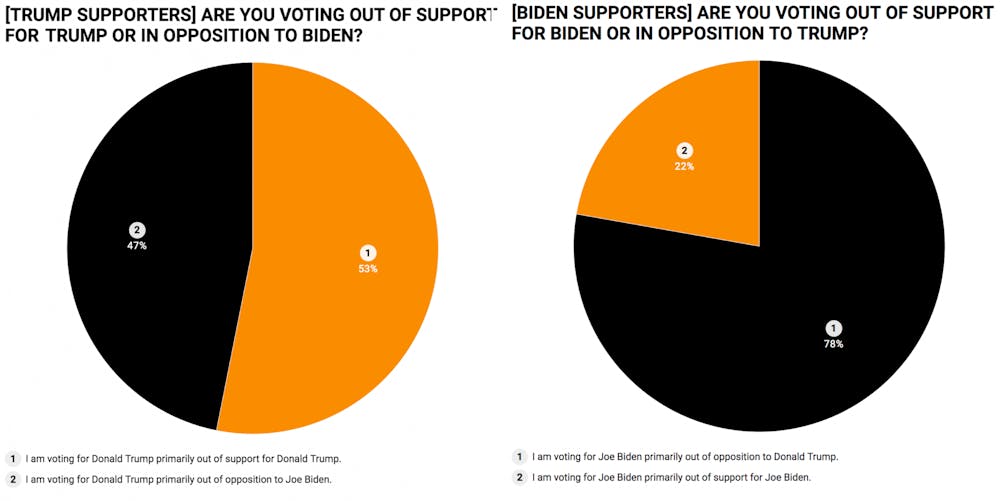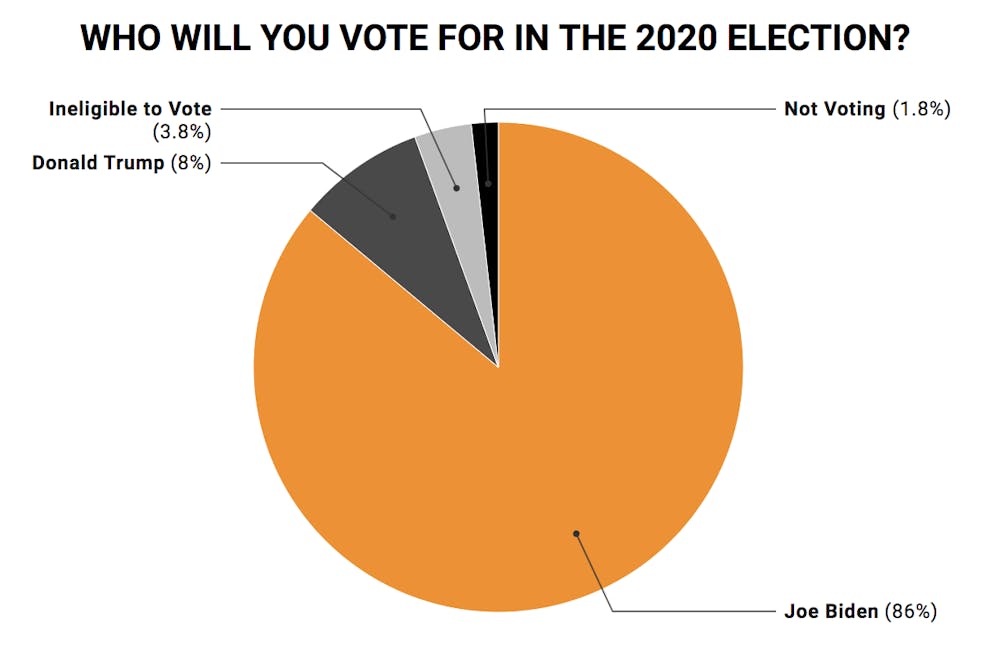“I don’t really care if you’re settling for Biden, as long as you’re voting for him,” said Celia Buchband ’22, president of the Princeton College Democrats.
Buchband serves as an Associate Chief Copy Editor at The Daily Princetonian.
Many students did just that, according to a recent survey by the ‘Prince.’ Though dissatisfaction with both major-party Presidential candidates runs high among the student body, 98.5 percent of the eligible students surveyed still intended to vote in the 2020 Presidential election. A large majority of respondents, and 87.6 percent of those voting, said they would cast their ballots for Joe Biden.
On Oct. 27, we emailed our survey to all undergraduate students listed on the Residential College Student Facebook. Though we limited the Google form to University-issued email addresses, all responses were collected anonymously. The form did not accept multiple submissions from the same address.
The survey asked about students’ voting plans, registration statuses, and views on the Presidential candidates. We received 469 responses.
Of those who gave their voter registration status, 95.3 percent were registered to vote in the United States, most commonly in New Jersey. Only one eligible respondent reported not registering.
Of those eligible, 56.8 percent are first-time voters. In an unusual election year during a global pandemic, 318 students, or 71.3 percent of respondents who said they were voting, did so via mail-in ballot, while 11.6 percent planned to cast their ballots at the polls on Election Day. 16.3 percent said they had voted or planned to vote early in person.
27 percent of eligible respondents registered as independent or unaffiliated with a political party, while 64.5 percent were registered Democrats and 7.7 percent were registered Republicans.

Of those who lean Democrat, a small majority — 53.4 percent — were satisfied with Biden as a candidate.
Dissatisfaction with their party’s nominee was also apparent among Princeton students who lean Republican, 60.3 percent of whom said they were unsatisfied with Donald Trump as a candidate.
Though respondents tepidly supported their own party’s candidate, strong dislike for their respective opponent informed how most voted. This trend was most noticeable among Biden supporters, 77.8 percent of whom claimed to be voting mainly out of opposition to Trump. Among Trump supporters, 46.9 percent said they were voting primarily against Biden.


Khadijah Anwar / The Daily Princetonian
Some students dissatisfied with either major-party candidate instead voted for another candidate — most commonly Jo Jorgensen, the Libertarian Party’s nominee.
When asked why they opted for a third party, one surveyed student, a registered Libertarian voting for Jorgensen, said, “the party and candidate I am voting for align more closely with my political views.” Another student, who also intends to vote for Jorgensen, said, “it is not a wasted vote for who you respect and agree with the most.”
Over 75 percent of students voting for third-party candidates said their decision primarily reflected opposition to both Biden and Trump.
Some students opposed to both major parties chose to sit the election out. Braden Flax ’21, a writer for the Princeton Progressive and an opinion columnist at the ‘Prince,’ is a self-identified Trotskyist who decided not to cast a ballot. Flax said, “History just doesn’t bear out the approach of constantly submitting to lesser evil.”
He continued, “Voting every now and then for which sector of the ruling class gets to oppress us is not my idea of democracy, and the President in particular serves as the CEO of American imperialism.”
By contrast, 98.5 percent of eligible respondents were participating even if they did not fully agree with the candidates. Among left-leaning students, many former Sanders or Warren supporters chose to “settle for Biden,” though he is less progressive than their preferred candidates in the primaries.
Maryam Ibrahim ’23, treasurer of the University’s Young Democratic Socialists and a copy editor for the Princeton Progressive, was disappointed that one of her least favorite choices received the Democratic Party’s nomination. She is supporting Biden, however, because “as the situation has developed, especially this summer with an upsurge in the Black Lives Matter movement once again, it made me realize the importance of having a Democrat in office.”
Although 187 out of 401 Democrat-leaning students said they were dissatisfied with Joe Biden as the party’s candidate, only 3.1 percent of those eligible said they would not vote for him.
Buchband also did not rank Joe Biden as her top choice in the primaries. However, she appreciates that in the past few months, “the policy plans he’s come out with have been really detailed and have been built with a coalition of Democrats, from the more progressive left to centrists.”
Nate Moore ’22, who led a “Students for Pete” chapter on campus last spring and said he “appreciated the young and fresh perspective” of Pete Buttigieg in a primary dominated by older candidates, also decided to support Biden. Regarding the general election, Moore said that he had “gotten a lot more excited about Biden over the past few months,” though he still wished Biden were “twenty years younger.”
Moore recognized that there are “certain segments of the Democratic Party who are not excited about voting for Biden,” but he hopes that these people still do.

Khadijah Anwar / The Daily Princetonian
Most Biden-supporting students wish he were more progressive. Of respondents who support Biden, 63.8 percent wished his stances and policies were further left; just slightly over a quarter were happy with his politics as they stand. They were most commonly satisfied with his stances regarding the coronavirus pandemic and reproductive rights, with 60 percent and 55.1 percent satisfaction, respectively.
Biden supporters were most commonly dissatisfied with Biden’s position on policing and racial justice. After a summer of nationwide protests against police brutality, Buchband noted, “There’s certainly a lot more room for the Democrats to push him on racial justice plans.”
Ibrahim appreciated that Biden “acknowledges racial disparities in the criminal justice system,” but noted that he “doesn’t necessarily want the same reforms to the incarceration system” as she does. Though she said “he could do better” when it comes to racial justice, she agreed far more with Biden than Trump on the issue, calling Trump’s stances “very concerning.”
After racial justice and policing, climate change was the third most common concern among pro-Biden respondents. 45.3 percent reported dissatisfaction with Biden’s proposed climate change policies.
Biden’s plans to combat climate change are not as progressive as those proposed by other Democratic primary contenders, such as Bernie Sanders and Elizabeth Warren. While Buchband noted that Biden released “the most progressive climate change plan a Democratic nominee has ever had,” Moore remained concerned about Biden’s support of fracking.
Trump supporters were also dissatisfied with their preferred candidate’s environmental stances. Asked to select the issues on which they disagreed most strongly with Trump, 59.1 percent chose climate change.
Many pro-Trump respondents also disagreed with Trump’s stances on racial justice and reproductive rights, with 45.5 percent and 43.2 percent of supporters reporting dissatisfaction, respectively. A majority of pro-Trump respondents, however, said they were satisfied with his stances on the economy and foreign policy.
Rebekah Adams ’21 does not agree with all of Trump’s policies, including how he has handled the coronavirus pandemic. She still considers herself pro-Trump, however, and intended to vote for him. Differing from other pro-Trump respondents, who raised concerns about Trump’s policies on racial justice, Adams recently published an opinion piece in the Princeton Tory, arguing that Trump “is a force for good for Black Americans and is leading our nation in the right direction.”
“I haven’t seen this much progress under any President in my lifetime before,” she said.

When asked to choose the 3-5 issues about which they felt most passionate, 70.7 percent of respondents included climate change. The other most common issues that respondents chose were racial justice, the coronavirus pandemic, healthcare, and economic inequality.
Khadijah Anwar / The Daily Princetonian
With the country in the middle of an ongoing racial justice movement, climate crisis, and pandemic, college students are living through a turbulent moment in history, and perhaps feel, more than ever before, the impact of politics on their lives. Tonight, along with the rest of the nation, they eagerly await the results.
“For Princeton students,” Buchband remarked, “this may be a year where we’re really feeling the stakes.”








